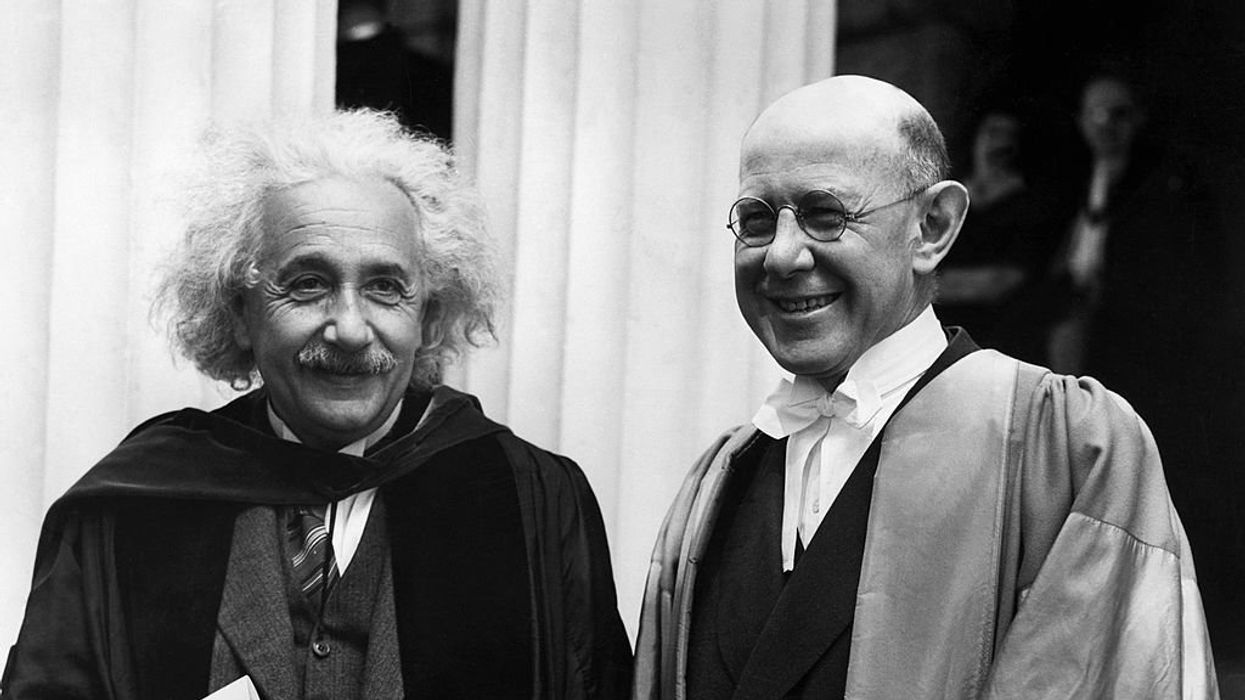
AFP/Getty
Americans pray to the false gods of intelligence and expertise
Judeo-Christian culture has an intelligence problem. Not to put too fine a point on it, there’s a special propensity to make an idol of the intellect.
Look at the origins of the biggest hype phrase of the millennium: smart power. Two intellectuals share credit for its coinage: Joseph Nye, legendary political scientist of international relations and a Unitarian Universalist, and Suzanne Nossel, a veteran of the corporate, NGO, and federal government elite whose grandparents escaped Nazi Germany and who feels at home during her frequent stays with family in Israel.
For high-performing Americans of Christian and Jewish heritage with a limited connection to the strictures and practices of their ancestral religions, the temptation to transition into effective smarts-worshipers can often be too sweet to resist. Intelligence holds out to the ambitious and well-meaning universe a possibility that’s too good to be true: the power to simulate or imitate all virtues, reorganizing ethics, justice, and order on the basis of ever-more-perfect analysis.
Intoxicated by this heady brew, intellectuals trying to prove they don’t “need” religion to be pure, healthy, and authoritative end up a lot easier to fool and manipulate than they might pride themselves on. Ironically, there’s nothing quite like the allure of smarts to make a dummy of the smart.
In a still greater irony, that’s why so many intelligent elites have pivoted so hard of late to worshiping intelligence more overtly and self-consciously. You see, they’ve gotten so smart that they’ve taken human intelligence to a cosmically transcendent point — building a machine intelligence that will soon outstrip everyone’s ability to rub brain cells together.
Soon, we’re told, machine intelligence will become self-replicating, self-improving, positively god-tier. Jensen Huang, CEO of NVIDIA, the corporation that’s propping up the whole U.S. economy, hails this process as a new industrial revolution, with the factories of the onrushing future mass-producing not widgets or bullets but manufactured intelligence.
As some technologists are noticing, however, the current trajectory of AI is already far enough below the hype-set expectations to surmise that we “probably” won’t have gods-in-a-box anytime soon. In fact, judging by the recent past of our breakneck technological development, there’s not much to stop AI from falling into the same disappointing patterns as the rest of our “mind-blowing” mechanical inventions.
Think of spam. How long was it in years between the elite’s fawning over the “information superhighway” and the public’s spam-clogged experience of the daily email grind? How long between the explosion of freewheeling speech and association on social media and the convergence of content rewarded by the algorithm on disposable “viral” fast food? Even in the online media, the tendency of news to become mere filler is almost inexorable.
The dilemma for elites is clear. They’ve already caught on that being smart isn’t enough to rule machines made to be smarter than the smartest, recasting themselves as the priests of a new smart religion who alone can be trusted to manage relations with the gods-in-a-box. But to get there, they have to spam the “smarts” button as never before — flooding every inch of our lives with so much automated “smart power” that, inevitably, the per-unit value of smarts drops, like that of all overproduced commodities.
In other words, no sooner do they pivot to making a religion of intelligence than they have to face the farcical fact that they’re turning intelligence itself into the ultimate spam.
That’s why the next step is, as close watchers of tech have known for a long time, a pivot from spam to sorcery. As Jash Dholani recently noted, “Issac Newton was an alchemist. Alan Turing thought telepathy is real. It's undeniable at this point that people at the upper bounds of intelligence are quasi-mystics,” from William James to Jack Parsons to John Dee, Queen Elizabeth’s court (deep breath) alchemist, astronomer, astrologer, and occultist. It was Dee who advised the creation of a global “British Empire” — one hardly composed of merely material forms of domination.
Having blocked themselves off from the world of holy spiritual power and authority receivable through God Almighty, exceptional humans throughout the ages have turned to the darker arts of immaterial influence, technologists not at all excepted. The archetypal story of the Christian convert St. Cyprian the Sorcerer illustrates the happy ending to the travails of the high achiever trying to rise above his peers by descending to spiritual depths.
The not-so-happy ending, of course, waits at the end of the wider path — one strewn with history’s cult leaders, “faith-based” flimflam artists, and spiritualist con men. In the Faustian fable of the "Sorcerer’s Apprentice," the titular wizard saves the day by intoning the incantation that undoes his underling’s out-of-control broom-spamming. In real life, no occultish magic is required to save us from such a fate. The truth is much more heavenly — and more humble — than that.
- YouTube youtu.be
James Poulos
BlazeTV Host